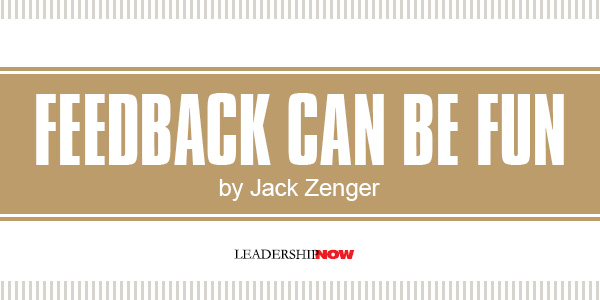 |
 |
10.03.12

Feedback Can Be Fun
WHY DO PEOPLE all over the world enjoy participating in games and sports? Why have games and sports been going on for not just centuries, but millennia? One of the theories is that they provide immediate feedback. The batter in a neighborhood game of softball knows immediately if he hits or misses the ball. If it is hit, it is clear whether it is in bounds or a foul ball. It’s clear if it bobbles into the infield or sails over the fence for a home run. The tennis player learns immediately how the angle of the racket and the strength of the swing can cause the ball to be returned too low and hit the net or if it is hit too high and too hard it goes out of bounds. Indeed, a good part of the joy and appeal of every sport is this immediate feedback. It also enables the player to make an infinite number of adjustments necessary to improve performance. It’s important for organizations to become feedback-rich environments in which information flows freely and is accepted and acted upon. It is obviously not enough to simply have feedback given if it is angrily rejected or dismissed because of the source. There is a Swedish proverb that says, “With the eating comes the appetite.” We have found that the more that feedback is shared in organizations, the more easily it is digested and acted upon. Attitudes about feedback in companies that have been doing 360-degree feedback for 25 years are extremely different from those doing it for the first time. Within organizations that routinely provide feedback, there is a much higher degree of eagerness to get data. At the same time, there is a calm and ease about being able to dismiss the occasional outlier number or comment. Good things come from asking for feedback. Seeking the opinions of others has a host of benefits. It conveys respect. It reduces barriers between the levels. Managers learn valuable information that comes in no other way. Empirically it reduces by 10 percent the number of employees who intend to leave. Clearly the ideal is for managers to both give and get, but if you had to choose one or the other, our data suggests that it is better to receive than to give.  
Posted by Michael McKinney at 11:01 PM
|
BUILD YOUR KNOWLEDGE
 

How to Do Your Start-Up Right STRAIGHT TALK FOR START-UPS 
Grow Your Leadership Skills NEW AND UPCOMING LEADERSHIP BOOKS 
Leadership Minute BITE-SIZE CONCEPTS YOU CAN CHEW ON 
Classic Leadership Books BOOKS TO READ BEFORE YOU LEAD |